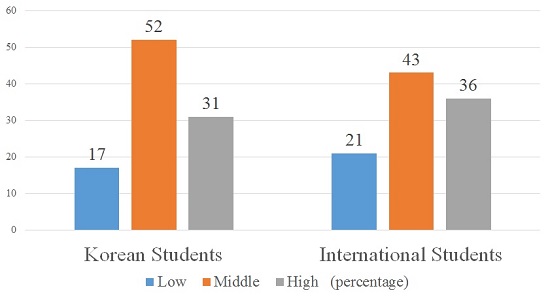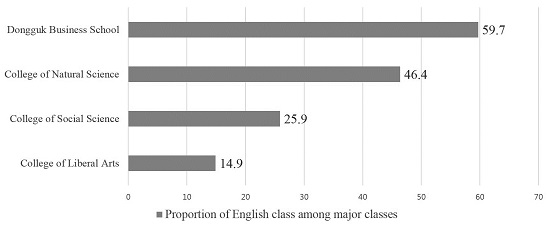An in-depth look at the criteria of ranking system and what they really mean
Dongguk University was ranked 11th overall in a university assessment survey released on October 6th by the Joongang Ilbo. In particular, it was ranked third as a ‘globalized’ university, behind only Hankuk University of Foreign Studies and Hanyang University (Seoul campus). Dongguk’s globalization ranking went up one grade higher compared to last year’s. It scored 3.4 out of 5 and ranked eighth overall in international exchange student rate among the whole Dongguk students. Secondly, it scored 5.9 out of 10 and ranked second in undergraduate international student proportion. Thirdly, it scored 9.4 out of 10 and ranked 11th in proportion of international professors among faculty. In fourth, it scored 10 out of 10 and ranked first in the proportion of major classes that were taught in English. However, such rank can easily be achieved when a university has more than 20 percent of classes from all majors taught in English. In fifth, it scored 8.3 out of 10 and ranked in fifth place in the number of students taking courses in universities abroad. Finally, the school scored 2.3 out of 5 and was placed in 23rd, in the diversity of international students. This could seem low compared to other high-scored factors. However, the rank was higher than last year; and has been increasing over the last seven years.The university received an outstanding grade, placing itself inside the top eleven in five criteria except for diversity. This result is due to several factors that has been done well. First of all, various systems and programs were offered to students who want to learn foreign languages. For example, English Zone and English Clinic programs are running in Hyehwa Hall to make students feel English more comfortable. Additionlly, international student ratio has been rising due to the overall support. In terms of international undergraduate students, scholarship system is finely arranged for them. For exchange students, Dongguk Buddy and international student tutoring programs are available. International students will be teamed up with a Korean student and teach their languages to their ‘buddy.’ Thirdly, international students for language courses are supported by conversation buddy program. It aims at helping international students to improve Korean language proficiency.Last but not least, the Office of International Affairs aids not only international students but also Korean students who want to study languages abroad. For example, hybrid program and double-degree program are offered.Nonetheless, do students really see the signs of this globalization? Also, do Korean and international students actually feel the same way about this issue? A survey was conducted among 400 Korean students to find out what they think about the globalization of the school. The survey asked students to give their views on the globalization of the school on a scale from one to five. With five indicating strong agreement, the average of the scores was 3.06. Also, 81 percent of the students also mentioned that Dongguk University does not deserve to be considered as the third-most globalized school for two main reasons. The first is because most of the international students are limited to certain nationalities. The second is that, while Dongguk does have many classes in English, the actual delivery of these classes in English is poor. Another survey was conducted among 100 international students in the school including both undergraduates and exchange students. It showed similar opinions. The average score was 3.17, not much different from Korean students’ opinions. However, 82 percent of the international students agreed that the school deserves the position because of the high proportion of international students of the student body. As these surveys indicate, the title which Dongguk has achieved does not match up with what students at Dongguk think. While many of the international students expressed the view that the title is reasonable because of a large number of the international students, Korean students criticized that the number of the international students does not truly represent the globalization of school. There were several other areas in which Dongguk needs to show improvements in order to be considered as a truly globalized university.
 | ||
| According to the survey conducted among Korean and international students, they have different opinions on globalization ranking of Dongguk University. This is an opposite result compared to the Joongang Ilbo university ranking of third-globalized university in Korea. | ||
The Side Effects from Rapid Growth in Terms of Globalization
The areas that Dongguk needs to show improvements
in order to be considered as truly-globalized
Major classes in English
The first problem is about offering major classes in English. Even though Dongguk University ranked first in terms of the English class ratio according to the Joongang Ilbo, the evaluation only examined the number of English classes, despite the fact that the English classes lack in quality and are not evenly distributed between majors. When it comes to distribution, the ratio of major classes in English is very high in Dongguk Business School and the College of Natural Sciences, where 59.7 and 46.4 percent of major classes are English classes, respectively. However, other Colleges including Social Science and Liberal Arts with the Department of English Language and Literature which are excluded from the criterion of the Joongang Ilbo University Ranking, have much lower ratios of 25.9 percent and 14.9 percent respectively.
 | ||
| The above graph indicates that Dongguk major classes in English are distributed unevenly among Colleges. In Dongguk Business School, including Department of Management, Accounting, and Management Information Systems, nearly 60 percent of major classes are English class. However, in the College of Liberal Arts, only 14 percent of them are English class. This can cause dissatisfaction on both sides. | ||
Secondly, the quality of classes in English is debatable. Most of Korean professors are having difficulties explaining specific, major-related content in English, and of course students are having trouble understanding these lectures. One professor from the College of Engineering said, “I think both professors and students are having hard time, since delivering academic and professional knowledge in English is a tough task for professors. Understanding it in non-native language form is also overwhelming for students. If students cannot gain knowledge from the lecture, then for whom does the lecture exist?” A sophomore majoring in Business Administration said, “The major classes are hard to understand even in Korean. When I take my major class in English, I can understand only 70 percent of them.”International students are also unsatisfied with classes in English. They expected to be able to continue studying their majors in English classes. However, Korean professors often use Korean during class, simply because they are uncomfortable using English. One Japanese student, majoring in Law, said, “I expected a full English lecture. However, the professor apologized to international students saying that he is going to use Korean mostly in his ‘English’ class.” These problems regarding qualities of English lectures occur because Dongguk University has been focusing only on pulling up the university ranking by increasing the number of major classes in English. For instance, all new professors must teach at least one English class since 2007, and students must fill half of their major classes with English classes. Dr. Lee Sun-young, a research professor in DCTL (Dongguk Center for Teaching and Learning), said, “The DCTL held a meeting of professors and students from various colleges to discuss problems of English classes, and there was much dissatisfaction on both sides. Dongguk University must establish criteria to evaluate the quality of English classes rather than focusing on increasing the number.”
Lack of diversity among International students
Another problem that Dongguk faces is a lack of diversity among international students and infrastructure. Even though the school earned third position in terms of globalization, the school placed 23rd in terms of diversity among international students, which is comparatively very low. This is mainly because, as many students have pointed out, most of the international students are limited to Asian countries. According to data which shows the breakdown of incoming international students for the second semester, out of 149 students from 28 countries, 77 were from Chinese-speaking countries, or from Japan or India. These three countries alone make up 51.6 percent of the exchange students. The Office of International Affairs, the department that manages exchange students, pointed out the need to distinguish between undergraduates and exchange students. Kwon Se-jin, a staff member of the department mentioned that the diversity of exchange students is actually quite good compared to other universities in Korea. On the other hand, it is true that most of the international students, possibly 7-800 out of 1,000, are undergraduates who are from Chinese-speaking countries. This might be one of the factors for the lower ranking. Jun Ki-yeon from Dongguk University Service Center for International Students, stated, “It is a well known fact that 75 percent of the international undergraduates are from China. In fact, Dongguk University does not really have strength to attract students from European and the North American countries. For example, when it comes to other universities in Seoul such as Yonsei or Sogang University, their language schools are more highly regarded than ours regarding the size, skill, and the number of participants. Since such aspects build the school’s reputation, Dongguk has less opportunities to strengthen its reputation among colleges in Korea. That is why the school targets Asian countries rather than Europeans and Americans.” She also indicated that the diversity among international students actually has improved. Even four or five years ago, the number of students from China took 90 percent. To overcome this issue the Dongguk University Service Center for International Students put efforts to attract students from Asian countries. They contacted the Malaysian and Indonesian embassies to accept state scholarship students and they toured Southeast Asia to attract students through study-abroad exhibitions. Still, as the two departments indicated, current efforts to attract international students are mostly limited to Asian countries.
 |
Lack of infrastructure to assist foreign students
Moreover, there is a lack of infrastructure to assist international students; mainly because there are not enough staff members who can speak Chinese or Japanese fluently. Except for the Office of International Affairs, which only manages exchange students, many other divisions in campus have experienced communication problems. For example, the Service Center for International Students often seeks help from international students from China to overcome the language barrier with Chinese students. Even though all of the assistants are Chinese and all of the labor students are international students, it is still challenging because many of them are still unskilled due to not enough experiences. Moreover, since there is no employee who can speak Japanese, they often ask for help from the Institute of International Language. The Student Counseling Center that provides consultation for students has no staff members who can speak either Chinese or Japanese. For this reason, except for counseling from Gender Equity Center which can provide English consultations, the Office of International Affairs takes care of the students with poor results. Additionally, the DCTL and Student CS Center both provide neither Chinese nor Japanese service. Regarding this problem, a freshman, Huangyuting, majoring in Food Economics, said, “I have been to Student CS Center, yet they did not provide Chinese service. Because I cannot speak Korean fluently, I tend to avoid visiting offices in school because most of them cannot speak Chinese, as far as I know.”
Treatment for foreign professors
The last issue that needs improvement is treatment towards foreign professors. As the number of a full-time professor being one of the criteria for university assessment, it is highly desirable for Dongguk to hire more foreign professors. However, this does not mean the school offers a great deal for them. One of the professors in Dongguk, outside Dharma College, pointed out that there is a problem in employment contracts by saying, “Changing from a temporary contract to a tenure-track one is almost impossible because this involves publishing an unrealistic number of journal articles. Without being in a tenure-track position, a professor cannot get a sabbatical or financial support from the university to attend conferences. Similarly without tenure track, there is no job security, little chance for promotion or even for salary increases. In other words, the administration wants us to come and work here but does not provide a normal and professional career path for us.” Additionally, international faculty is essential to the globalization of any university, and Dongguk needs to improve such problems. Dongguk University was ranked in 29th place in 2008, when the Joongang Ilbo first started its university evaluation. However, it has improved itself during last seven years, and is finally staring Korean top 10 universities in the face. The most important point that Donggukians should take more interest in is the rate of globalization, in which DGU has ranked eight places higher than its overall rating. It can be said that this could be possible due to the school’s effort to attract international students and to upgrade students’ language ability. On the other hand, there are several holes in the strategy and weak points that need to be improved, specifically the lack of quality and uneven distribution of English classes, the low diversity of foreign students, and treatment for foreign professors. Dongguk University should take steps both externally and internally towards being recognized as a top globalized university through the combined effort of both students and school authorities to overcome these problems.

